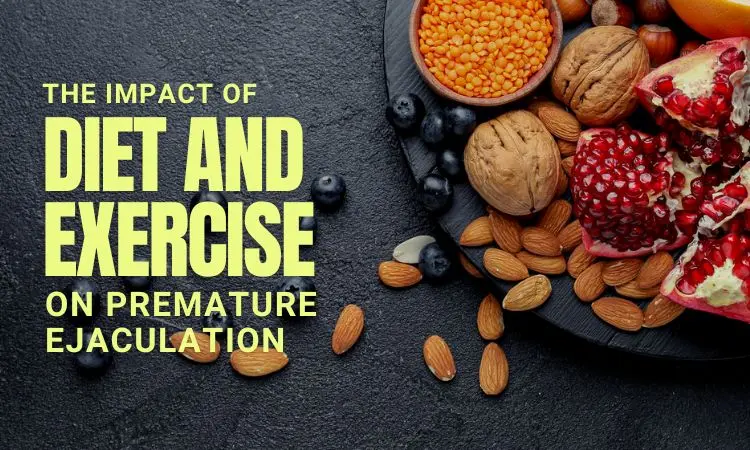Premature ejaculation (PE) is a widespread sexual dysfunction impacting numerous men globally. Characterized by the inability to delay ejaculation during sexual intercourse, PE can lead to stress, anxiety, and relationship problems. While there are various treatments available, including medications and therapy, lifestyle changes, particularly diet and exercise, can play a significant role in managing this condition.
Understanding Premature Ejaculation
Premature ejaculation is defined as ejaculation that occurs sooner than a man or his partner would like during sexual intercourse. It is classified into two categories:
- Primary (Lifelong) PE: This occurs from the first sexual experience and continues throughout life.
- Secondary (Acquired) PE: This develops after a period of normal sexual performance.
The causes of PE are multifaceted, including psychological factors (stress, anxiety, depression), biological factors (abnormal hormone levels, neurotransmitter imbalance), and lifestyle factors (poor diet, lack of exercise, substance abuse). Understanding and addressing these underlying causes can help in managing and treating PE effectively.
The Role of Diet in Managing Premature Ejaculation
Diet is fundamental to overall well-being, encompassing sexual health as well. Specific foods and nutrients have the potential to optimize blood circulation, elevate hormone levels, and uplift mood, all of which are pivotal for enhancing sexual performance.
- Foods Rich in Zinc: Zinc is essential for testosterone production, which is crucial for sexual health. Foods such as oysters, beef, pumpkin seeds, and spinach are rich in zinc and can help improve sexual function.
- Magnesium-Rich Foods: Magnesium helps in muscle relaxation and can reduce anxiety, a common cause of PE. Including foods like dark chocolate, avocados, nuts, and leafy greens can be beneficial.
- Omega-3 Fatty Acids: These fatty acids improve blood flow and heart health, which are vital for maintaining erections.
- L-Arginine: This amino acid helps in the production of nitric oxide, which improves blood flow. Foods high in L-arginine include turkey, chicken, peanuts, and soybeans.
- Avoiding Processed Foods and Sugars: High consumption of processed foods and sugars can lead to obesity, diabetes, and cardiovascular issues, which are risk factors for PE. A balanced diet with whole foods can improve overall health and sexual function.
The Impact of Exercise on Premature Ejaculation
Maintaining a healthy body and mind necessitates regular physical activity. Exercise can help reduce the symptoms of PE in several ways:
- Improving Cardiovascular Health: Cardiovascular exercise, such as running, swimming, and cycling, improves heart health and blood circulation, which are critical for sexual performance. Better blood flow can enhance erections and stamina during sexual activity.
- Reducing Stress and Anxiety: Exercise is a natural stress reliever. Activities like yoga, meditation, and deep-breathing exercises can help calm the mind and reduce anxiety, which are common psychological causes of PE.
- Strengthening Pelvic Floor Muscles: Kegel exercises, which involve tightening and relaxing the pelvic floor muscles, can improve control over ejaculation. Regular practice of these exercises can enhance the strength and endurance of these muscles.
- Boosting Testosterone Levels: Resistance training, such as weightlifting, can increase testosterone levels. Higher testosterone levels are associated with improved sexual function and reduced symptoms of PE.
- Enhancing Body Image and Confidence: Regular exercise can lead to weight loss and muscle gain, improving body image and self-esteem. Increased confidence can reduce performance anxiety, which often contributes to PE.
Integrating Diet and Exercise into a Lifestyle for Managing PE
Adopting a healthy lifestyle that incorporates a balanced diet and regular exercise can significantly impact the management of PE. Here are some practical tips to integrate these changes:
- Create a Balanced Meal Plan: Focus on whole foods, including plenty of fruits, vegetables, lean proteins, and healthy fats. Avoid processed foods and sugars. Plan meals ahead to ensure a balanced intake of essential nutrients.
- Regular Physical Activity: Aim for at least 150 minutes of moderate aerobic activity or 75 minutes of vigorous activity each week, along with strength training exercises twice a week.
- Mind-Body Practices: Incorporate stress-reducing activities like yoga and meditation into your routine. These practices can help manage anxiety and improve mental health.
- Stay Hydrated: Drink plenty of water throughout the day to maintain hydration, which is important for overall health and sexual function.
- Avoid Harmful Substances: Limit alcohol intake and avoid smoking, as these can negatively impact sexual health and contribute to PE.
Diet and exercise are powerful tools in the management of premature ejaculation. By improving cardiovascular health, reducing stress, and boosting confidence, these lifestyle changes can enhance sexual performance and overall well-being. For those seeking additional support, Lal Clinic offers specialized treatments for PE, combining medical expertise with personalized care to help men achieve better sexual health and quality of life. Whether it’s through dietary guidance, exercise programs, or other therapeutic interventions, Lal Clinic provides comprehensive solutions to address premature ejaculation effectively.

